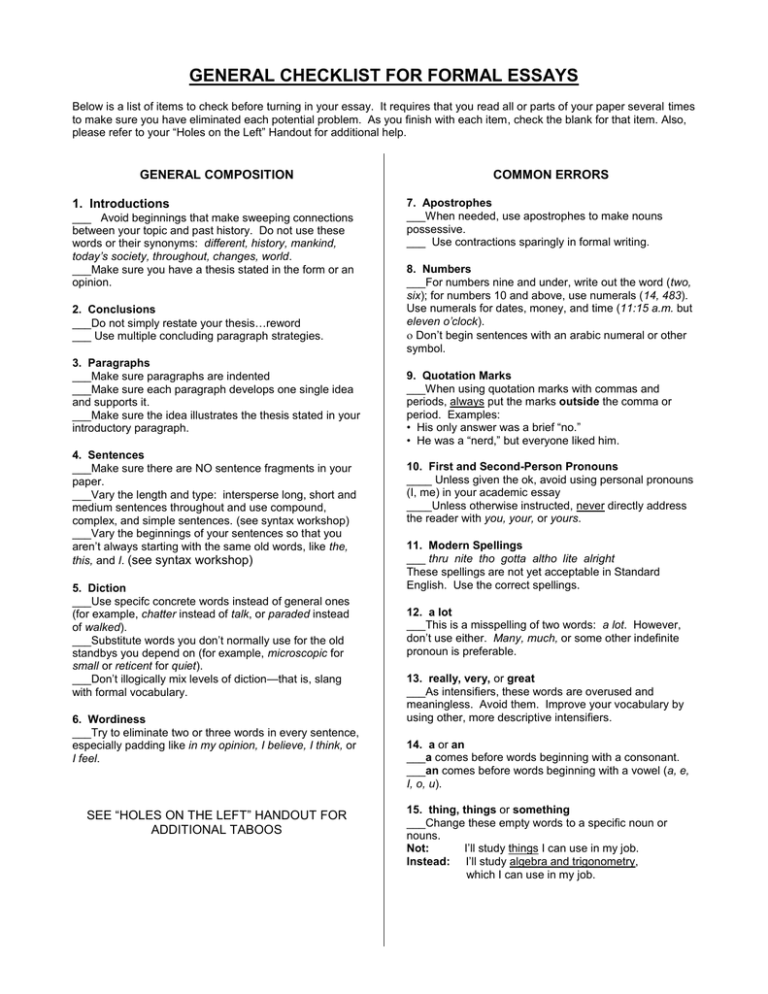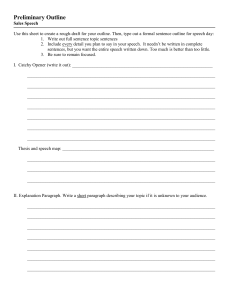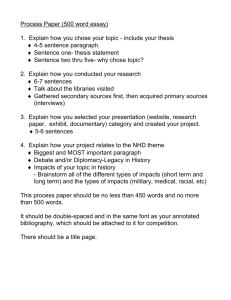GENERAL CHECKLIST FOR FORMAL ESSAYS
advertisement

GENERAL CHECKLIST FOR FORMAL ESSAYS Below is a list of items to check before turning in your essay. It requires that you read all or parts of your paper several times to make sure you have eliminated each potential problem. As you finish with each item, check the blank for that item. Also, please refer to your “Holes on the Left” Handout for additional help. GENERAL COMPOSITION 1. Introductions ___ Avoid beginnings that make sweeping connections between your topic and past history. Do not use these words or their synonyms: different, history, mankind, today’s society, throughout, changes, world. ___Make sure you have a thesis stated in the form or an opinion. 2. Conclusions ___Do not simply restate your thesis…reword ___ Use multiple concluding paragraph strategies. 3. Paragraphs ___Make sure paragraphs are indented ___Make sure each paragraph develops one single idea and supports it. ___Make sure the idea illustrates the thesis stated in your introductory paragraph. 4. Sentences ___Make sure there are NO sentence fragments in your paper. ___Vary the length and type: intersperse long, short and medium sentences throughout and use compound, complex, and simple sentences. (see syntax workshop) ___Vary the beginnings of your sentences so that you aren’t always starting with the same old words, like the, this, and I. (see syntax workshop) 5. Diction ___Use specifc concrete words instead of general ones (for example, chatter instead of talk, or paraded instead of walked). ___Substitute words you don’t normally use for the old standbys you depend on (for example, microscopic for small or reticent for quiet). ___Don’t illogically mix levels of diction—that is, slang with formal vocabulary. 6. Wordiness ___Try to eliminate two or three words in every sentence, especially padding like in my opinion, I believe, I think, or I feel. SEE “HOLES ON THE LEFT” HANDOUT FOR ADDITIONAL TABOOS COMMON ERRORS 7. Apostrophes ___When needed, use apostrophes to make nouns possessive. ___ Use contractions sparingly in formal writing. 8. Numbers ___For numbers nine and under, write out the word (two, six); for numbers 10 and above, use numerals (14, 483). Use numerals for dates, money, and time (11:15 a.m. but eleven o’clock). Don’t begin sentences with an arabic numeral or other symbol. 9. Quotation Marks ___When using quotation marks with commas and periods, always put the marks outside the comma or period. Examples: • His only answer was a brief “no.” • He was a “nerd,” but everyone liked him. 10. First and Second-Person Pronouns ____ Unless given the ok, avoid using personal pronouns (I, me) in your academic essay ____Unless otherwise instructed, never directly address the reader with you, your, or yours. 11. Modern Spellings ___ thru nite tho gotta altho lite alright These spellings are not yet acceptable in Standard English. Use the correct spellings. 12. a lot ___This is a misspelling of two words: a lot. However, don’t use either. Many, much, or some other indefinite pronoun is preferable. 13. really, very, or great ___As intensifiers, these words are overused and meaningless. Avoid them. Improve your vocabulary by using other, more descriptive intensifiers. 14. a or an ___a comes before words beginning with a consonant. ___an comes before words beginning with a vowel (a, e, I, o, u). 15. thing, things or something ___Change these empty words to a specific noun or nouns. Not: I’ll study things I can use in my job. Instead: I’ll study algebra and trigonometry, which I can use in my job.

